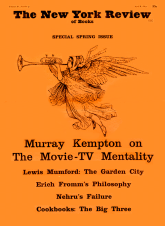In response to:
Rebel from the January 28, 1965 issue
To the Editors:
With the perceptivity and historic sweep characteristic of his study of Marx, George Lichtheim, in his review of Wilfrid Desan’s The Marxism of Jean-Paul Sartre, (Jan. 28) has covered considerable ground beyond both Sartre’s and Desan’s realms of reference, and included “a perfectly genuine, and very interesting, three-cornered debate among Marxists, Catholics, and Existentialists in France.” This writer is familiar with the new debaters, but thinks that they have created as closed an intellectual milieu as the Communist Party has in its domain. It has become fashionable to consider only those who are not Marxists by conviction to be the true exponents of Marxism. Your journal, I trust, will allow a Marxist-Humanist to express her views, especially as one of the themes in Mr. Lichtheim’s present review is but a variation of the one he made in his commentaries on my Marxism and Freedom (NYR, Dec. 17, 1964). There Mr. Lichtheim accused me of an inclination “to overrate his (Lenin’s) intellectual accomplishments (notably his rather amateurish Hegel commentaries)…” Here he credits Sartre with “an interpretation of Marx far above the level of the crudities of the Leninism school,” by which he means not only Communism (which I consider a euphemism for state-capitalism), but Lenin as thinker.
There is an undeniable duality in Lenin’s philosophic heritage between his Materialism and Empirio-Criticism (1908), which gave the green light to vulgar materialism, and his Philosophic Notebooks (1914), which broke new ground in interpretations of Hegel’s Science of Logic. But this should not give any one license to dismiss the significance of Lenin’s historic break from his own philosophic past, much less to hold up Sartre’s quite painful forcing of Marxism into his existential mold as a genuine interpretation of Marxian philosophy, or, for that matter, Hegelian dialectics. I have yet to see today’s Marxologists, East or West, grappling with Hegelian dialectics in as bold a manner as the “amateurish” Lenin who wrote exhilaratingly: “Subjectivity-Freedom…Alias: Man’s cognition not only reflects the objective world, but creates it.” The minute Mr. Lichtheim can name any “Marxists, Catholics, and Existentialists” who do not shy away from Hegel’s relevance for our day, I shall instantly prick up my ears, and most respectfully at that. Until that day, can’t we carry on debates by rules other than those of the jungle where all is fair in war (and love) and which, for purposes of downgrading Lenin, permits the upgrading of the argumentations of Sartre “far above the crudities of the Leninist school” in the very same breath in which one cogently describes Sartre’s “libertarian posturing in the service of totalitarianism.”
Raya Dunayevskaya
Detroit
This Issue
April 8, 1965



